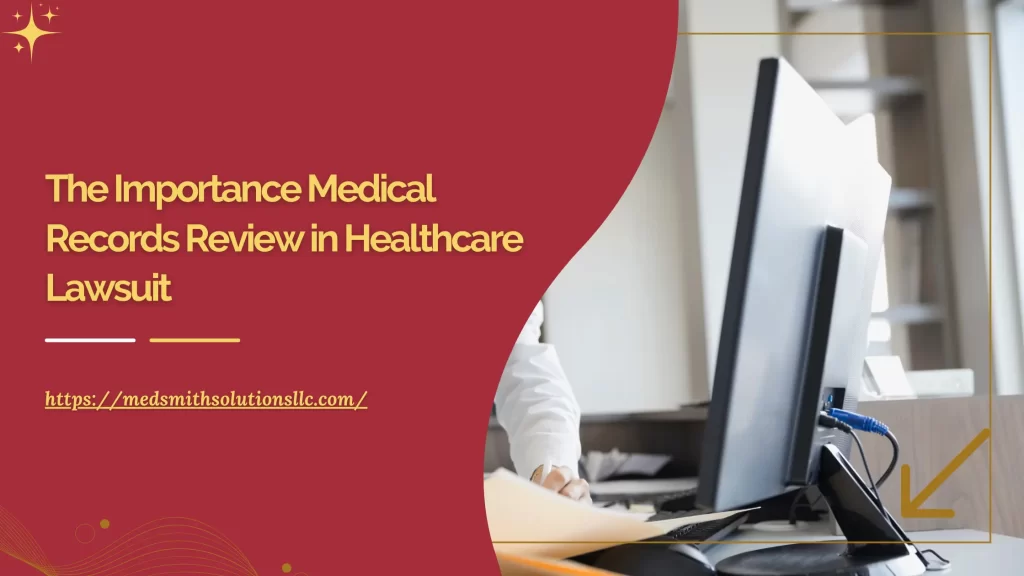
Introduction
Medical records review is an intricate and complex component of healthcare lawsuit that must be accurately performed for medical malpractice, personal injuries, product liability, and even workers’ compensation claims litigation. It serves as the legal foundation of court actions. Personally involved attorneys and litigators must analyze the medical records, determine the medical necessity, and verify the existence of any medical coding errors. The lack of adequate review processes can lead to major obstacles, such as absence of documents or inconsistencies in the claim’s records, which may severely influence the outcome of the litigation.
Role of Medical Records as Evidence in Healthcare Lawsuits
In legal cases involving medicine, medical records are of utmost importance because they contain cardinal elements of a patient’s history like their diagnosis, medications, social history, lab work, and treatment plans that they received. Medical practitioners, hospitals, and private practitioners who provide medical care and services for insurance claims utilize medical case records, along with other doctors, to verify the standard of care and subsequent negligence or even fraud inquiries. So organized medical records can be useful for establishing causation and attribution of blame in medical malpractice actions, social security disability cases, as well as insurance cases.
The Comprehensive Process of Conducting a Medical Records Review
Reviewing medical records is an orderly process of inspecting the hospital medical charts, electronic medical records, and all other patient records. This process normally comprises the following:
-
- Chronological Order Arrangement: Arranging medical records in a systematic order for easier analysis, thereby providing the ordered view of the patient’s medical history and treatment cycle.
-
- Medical Chronology and Timeline Creation: Formulation of a distinctive structured summary case of medicine which integrates major events such as diagnoses, lab tests as well as treatment procedures carried out.
-
- Categorizing Medical Records: Separating various types of records such as physician’s notes, radiology reports, operative notes, and medication records.
-
- Identifying Missing Records: Searching for gaps in the history of the patient that could be very important for case litigation as well as medical claims management.
-
- Medical Necessity and Billing Analysis: Scrutinizing the medical billing records in relation to claims to ascertain if the treatment was appropriate as well as identify possible fraudulent activities.
Overcoming Challenges in Medical Records Review
In as much as medical record review contributes a lot, it has many barriers including:
-
- Incomplete or Illegible Records: Missing information can weaken legal cases, making it difficult for attorneys to build strong arguments.
-
- Complex Medical Terminology: Attorneys and litigators often struggle with understanding intricate medical details, necessitating expert assistance.
-
- Volume of Records: Variations in the medical billing codes may result in many confusions concerning insurance claims and fraudulent activities.
The Value of Professional Medical Records Review Services in Healthcare Lawsuits
Legal professionals face challenges in grasping complicated medical components, which often require the aid of an expert. Now, in his own words, let’s break it down. Terminologies are indeed complex. Surgeons and other specialists are always required in almost every single healthcare-related lawsuit. Having a detailed patient history is incredibly exhausting and time-consuming to read through. It comes in handy in forensics.
The Role of Organized Medical Records in Court Proceedings
Legal professionals and law firms require assistance from experts due to the difficulty involved in reviewing the medical records. These professionals specialize in gathering pertinent information, summarizing patient backgrounds, and performing correct reviews of medical records. The accuracy, efficiency, and time required in these medico-legal procedures are made much better with the help of these services.
Conclusion
The analysis of medical records forms a critical aspect of a legal case. It’s only as good as the evidence presented in court and the medical records that are provided. Attorneys, litigators, and even some insurance firms call upon our services to help them with complex legal cases as well as with quality improvement and patient safety measures. Our professionals assist law firms in winning their cases, be they medical malpractice claims, workers’ compensation cases, or personal injury claims.
Need expert medical records review services? Partner with us to ensure accuracy, efficiency, and legal success in your healthcare lawsuits. Contact us today!




